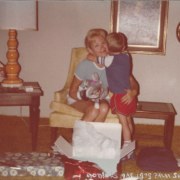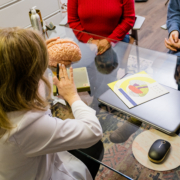7 tips for navigating holidays with a loved one who has dementia
The holidays are upon us, and whether your loved one is experiencing cognitive impairment due to Alzheimer’s disease, Parkinson’s disease, stroke, or any other cause, special planning and considering key changes to family traditions can help make the season more enjoyable for everyone.
Amelia Anderson-Mooney, clinical neuropsychologist with private practice in Glasgow, Kentucky, and assistant professor of neurology and graduate medical education for the University of Kentucky College of Medicine, said a few small tweaks to annual rituals can go a long way toward making everyone more comfortable.
“Adjusting holiday plans appropriately often begins with a good understanding of what disease stage our loved one is experiencing now,” she said. “If symptoms are mild, small adjustments can make a world of difference. If symptoms are moderate to severe, it’s likely that we will need to make more substantial changes. In mild stages, many elders with cognitive decline may be able to have a more active role in planning and preparing for family activities. In more advanced stages, their role will very likely be smaller but no less valuable.”
Here are seven tips for making the holiday season more comfortable for your loved one with dementia and everyone else.
Tip 1: Ask and learn
Sometimes we haven’t been fully aware of what our loved ones have been doing behind the scenes of our traditional holiday gatherings. When a loved one receives a diagnosis of dementia, it’s up to us to educate ourselves about the full extent of the responsibilities they have taken on over the years, and then have an open, direct discussion about what that loved one feels comfortable doing for this year’s holiday celebrations.
Anderson-Mooney said it’s important to make sure your loved one with dementia is involved in holiday preparation in a way that is meaningful to them. She said sometimes this can be accomplished by asking, simply, “What can we do to make the holidays easier for you?” Anderson-Mooney added that it’s critical to have this conversation with the understanding that elders with cognitive change may need additional time to gather their thoughts and respond.
“It is also important to remember some elders with cognitive change may not fully understand their limitations, which means a more substantial change in approach for us,” said Anderson-Mooney, who is a National Academy of Neuropsychology (NAN) board member and chair of NAN’s publications committee.
Tip 2: Delegate, delegate, delegate
If the person in your family with dementia is the person who has hosted holiday traditions, it might be necessary to rethink the entire celebration. Perhaps your loved one no longer feels able to prepare their home in a way that makes them feel ready. Perhaps they feel they can do it, but they need help. Anderson-Mooney said it’s always a good idea to offer to help make a list and gather volunteers to pitch in.
She added: If your loved one with dementia no longer feels comfortable handling the family meal solo, delegating tasks could be a golden opportunity to learn family recipes and traditions straight from the source so they can be passed down to future generations.
Tip 3: Keep tabs on overload
Anderson-Mooney noted that it’s also important to consider how much holiday cheer loved ones can handle at one time.
People with cognitive change often talk about how overwhelming it is to be in large groups of people, even people they love, because they feel like they can’t follow the conversations well. Because of this, they tend to withdraw, and that withdrawal can be hard for other family members to understand. If you have noticed your loved one having difficulty interacting in family gatherings during the year, your family may want to plan to have smaller gatherings more often.
Her advice: Make sure you build the day around what your loved one’s body needs Plan activities at a time of day when your loved one feels the sharpest and most energetic. Do your shopping outings before lunch. If your loved one feels and operates best in the morning hours, maybe a Thanksgiving breakfast is in order, with smaller visiting groups later in the day.
“The holidays are about being together,” Anderson-Mooney said. “That’s what matters most.”
Tip 4: Make travel easier
Cognitive decline often adds a layer of complexity if your family has traditionally traveled for the holidays. People with cognitive impairment often lean heavily on their daily routine to help them get by from day to day. Travel, by its nature, can disrupt that routine completely.
Anderson-Mooney said this means that travel might be out of the question for some people with cognitive impairment. She added that if a loved one has had trouble adjusting to relatively small changes in their daily routine at home, you can anticipate that they may not adjust well to the larger demands of traveling.
In extreme cases, or cases where a loved one is experiencing significant cognitive decline, it may be wisest to eliminate travel of any kind.
Tip 5: Build in time to rest
Sleep disruption can be very problematic for people with dementia. Anderson-Mooney said in practice, she often sees an increase in confusion and emotional upset from disrupted sleep. Again, if you have seen your loved one struggle to adjust to an earlier wake up time for a doctor’s appointment, or struggle to adjust to time changes or new time zones, for example, unusual holiday schedules or on quick trips can be doubly hard.
Consider also that traveling itself—whether it’s a one-hour car trip or a six-hour plane flight—can be exhausting.
Most people are familiar with the fatigue we feel after reaching our destination when we travel, even though we’ve just been sitting in a car all day or waiting for a plane. This fatigue happens, at least in part, because our brains are very busy processing all the novel scenery, keeping us safe in traffic, making sure we make our flight connections, helping us remember where we put our carry on bags, and so on. Anderson-Mooney said this fatigue can multiply in a serious way in people with cognitive impairment.
“If travel is in the plans for your loved one with cognitive impairment, consider breaking up the trip into smaller legs or adding a day before and/or after to allow your loved one to recover energy-wise,” she said.
Tip 6: Line up support
If you’re planning to travel for the holidays by car, be very realistic about whether your loved one can handle any of the driving. If you’re flying, airlines help vulnerable elders just as they do for unaccompanied minors. Most of this assistance is available in part because of the federal Air Carrier Access Act and the Americans with Disabilities Act. Airlines are required to offer assistance for seniors such as help in boarding and making connecting flights, and many airlines go above and beyond the basic requirements to ensure that their elderly passengers are well cared for in their travels. (This, this, and this are great websites for more information on the subject.)
Anderson-Mooney suggested that family members may want to consider adding an extra layer of support for loved ones with dementia.
Specifically, she advised that someone in the family (or a hired caregiver) accompany your loved one as the person’s personal “travel coordinator.” This person becomes responsible for carrying your loved one’s medications, keeping track of their valuables, and tracking the itinerary. The person also can be responsible for making sure that your loved one takes their medications on time while traveling and while on the ground at the destination. (Setting alarm reminders on the coordinator’s phone is a helpful way to make sure your loved one never misses a dose.)
Anderson-Mooney said the coordinator should travel with a full, printed list of medications, dose amounts, and dosage times, as well as names and phone numbers of your loved one’s doctors. She added that it’s important to keep the list and the medication in a carry-on bag so it’s not lost and separated from your loved one.
“It’s so important to consciously and deliberately appoint someone to ensure these things are done,” Anderson-Mooney said. “With some medications, missing doses can be dangerous. Replacing medications in lost baggage can be done, but it’s better to avoid the hassle in the first place.”
Tip 7: Providing physical care
Finally, Anderson-Mooney said it’s important to be mindful to maintain our loved ones’ physical needs in the hustle and bustle of the holidays.
Make sure your loved one is eating good quality food on a regular schedule. Make sure they stay hydrated while out and about in town and during busy family gatherings. Be very careful and limited with alcohol consumption. Deliberately add in more time for rest and recovery in your schedule. Set medication alarms to make sure we remember to take medicines during our activities (taking water with us is often necessary for this).
Again, it can be very helpful to have a dedicated person or group of people to watch over these needs for your loved one. If this is too big of a job for one person, designate a different coordinator for each day of the holiday, and switch throughout the celebration.
Closing thoughts
Of course, all these suggestions assume that your loved one is going to be an active, agreeable participant in adjusting to their own needs. Unfortunately, sometimes this is just not the case.
“Cognitive change is cruel and unforgiving, and it can completely change our loved ones’ personalities and ways of doing things,” Anderson-Mooney said. “Our loved ones may no longer be capable of understanding their own changes and adapting to their own needs. Our loved ones may no longer recognize us when we visit. We might deal with more agitation and anger, more upset, lashing out behavior. In these cases, our traditional plans just don’t make sense anymore.”
In these worse-case scenarios, Anderson-Mooney said we must adapt to a much heavier degree.
Specifically, if visits usually leave your loved one agitated and upset, it may be best to delay the holiday all together.
If visits leave your loved one confused, it may still be worth making the effort to celebrate together. Anderson-Mooney added that even if your loved one no longer recognizes you, they are very likely to recognize and understand that you are someone who loves and cares about them. They will appreciate your gesture of time and company, small gifts and comforts, favorite foods, and chatting about family photos. Spend time listening to their favorite music. Talk about their favorite memories from the past. Take the time to write down the family stories they tell before they fade away.
“This time can be a gift, even while you mourn the changes your family is experiencing,” Anderson-Mooney said. “Give the best love and honor that you can, and know that it matters, whether or not your loved one can appreciate it.”
This essay has been factchecked by members of NAN’s Publications Committee. For more about that process, click here.









